GALLUP NEWS SERVICE
PRINCETON, NJ -- Gallup's annual Environment poll finds Americans' stated concern about the environment is not matched by their willingness to make compromises on behalf of the environment. Sixty percent of Americans think environmental quality today is "only fair" or "poor," and 67% believe it is worsening, yet only 40% worry "a great deal" about the environment. Just half of Americans say environmental protection should take precedence when it conflicts with either economic growth or development of U.S. energy supplies.
According to the Mar. 13-16, 2006 survey, Americans today are more negative about the quality of the environment than in previous years. But they show no corresponding increase in their willingness to make the environment a priority over economic or energy concerns.
This all comes at a time when environmentalist groups are strengthening their focus on global warming as the preeminent environmental threat. Organizers of Earth Day, to be celebrated on Saturday, April 22, are using the occasion to kick off an international "Climate Change Solutions" campaign. While Americans report a higher degree of knowledge about global warming than ever, those saying they know a great deal about the issue are not much different from others in the degree to which they worry about the environment, or in their willingness to make the environment a priority.
Environmental Concern Up From 2005
There has been no meaningful change in recent years in Americans' perceptions of current environmental conditions. Forty percent of Americans, similar to the 41% recorded last year, say the overall quality of the environment today is either "excellent" or "good," while 49% consider it "only fair," and 11% call it "poor."
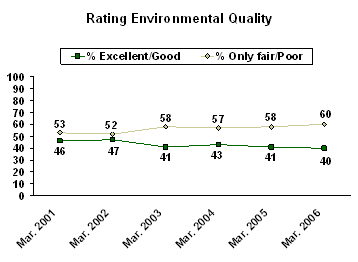
At the same time, Americans have grown more pessimistic about future environmental conditions. Two-thirds of Americans (67%), up from 63% in 2005 and the highest Gallup has recorded, say the quality of the environment is getting worse; just 25% say it is getting better.
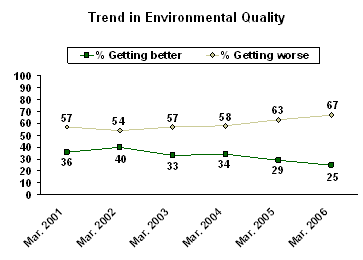
When combining these two attitudes, Gallup categorizes about half of Americans (52%) as negative about environmental conditions, 24% as mixed, and the smallest proportion (21%) as positive. The positive group is the smallest Gallup has recorded since the indicator was initiated in 2001.
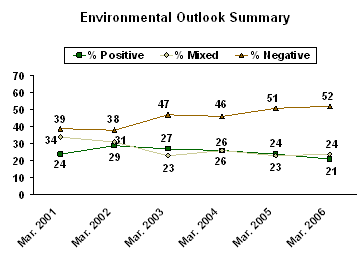
A similar increase in concern about the environment is seen in a separate question that asks Americans how much they worry about a number of domestic issues. Since 2005, there has a been a five-percentage point increase in the percentage saying they worry "a great deal" about the quality of the environment, and a seven-point increase in those saying they worry "a fair amount."
The combined 77% worried a great deal or fair amount matches what Gallup recorded in 2001, but exceeds what Gallup found in the intervening four years.
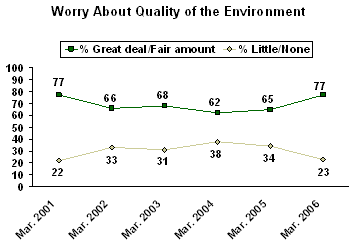
More Bark Than Bite?
While concern about the environment has picked up, the percentage saying the environment should take precedence over competing interests has not.
For more than two decades, Gallup has asked Americans how they believe environmental protection and economic growth should be balanced when the two interests conflict. To varying degrees, Americans have always chosen the environment. However, the 52% this year saying the environment should take precedence is on the low end of the historical range for those taking this position.
Today's preference for the environment is unchanged from the 53% recorded last year, and is much lower than the 67% to 70% who chose the environment in the late-1990s through 2000.
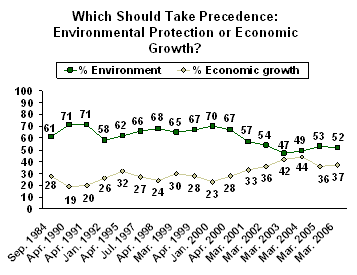
Separately, Gallup asks Americans how they believe environmental protection and energy production should be balanced when those two interests conflict. Americans are more closely divided on this tradeoff, with 49% choosing the environment but 42% choosing the development of U.S. energy supplies.
Americans' views on this are similar to last year's result, but compared with 2001, the public is now a bit more likely to say energy production should be the priority (42% vs. 36%).
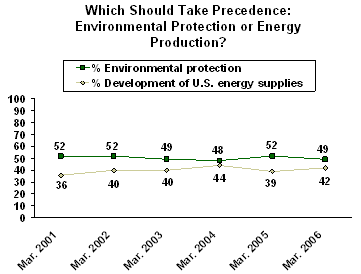
As reported in an April 7 Gallup news story (see related item) about one in five Americans (21%), up from an average of 16% over the previous five years, says they understand the issue of global warming "very well." Another 53% understands the issue "fairly well," while 26% do not understand the issue. Those who profess a very good understanding of global warming are no more likely than those who understand it fairly well to say that environmental protection should be given priority over energy production. They are somewhat more likely to hold this view, however, than those who admit to not understanding the issue well at all.
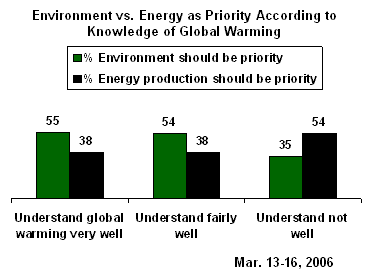
Americans' Sympathetic, but Not Active
Most Americans are at least sympathetic to the environmental movement, but only a few -- 14% in the latest poll -- report being active participants.
These figures have been stable since 2003, but Americans were somewhat more sympathetic to the movement in the preceding three years, from 2000 through 2002.
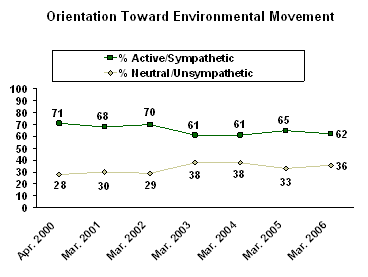
Gender, Not Generational, Distinctions
Today's Baby Boomers were witnesses in their formative youth to the birth of the environmental movement -- something often associated with the first Earth Day in 1970. But Gallup finds no evidence that this age demographic is more in tune with environmentalism today. In fact, there are only minor differences among major age groups in ratings of the environment, or in the percentages saying they are active in the environmental movement.
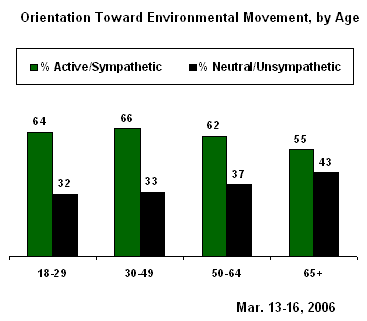
Greater differences are seen by gender, with women appearing to be more pro-environment than men. Women are more likely to worry about the environment, to take a dim view of environmental conditions, to be active in or sympathetic to the environmental movement, and to give precedence to the environment over economic and energy concerns.
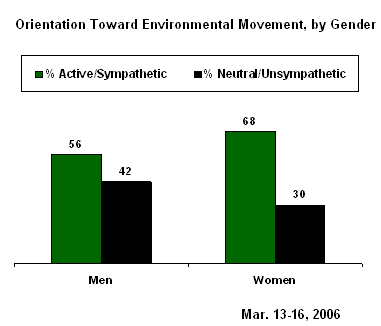
Attitudes on the environment are also partisan. According to Gallup's environmental outlook index, a plurality of Republicans (41%) are positive about environmental conditions compared with only 9% of Democrats. Most Democrats (and independents) are negative about the issue.
Democrats are also much more likely to be sympathetic to or active in the environmental movement (76% of Democrats vs. 49% of Republicans), and to give priority status to the environment.
Bottom Line
Gallup trends suggest that the contemporary heyday for environmentalism was in the late 1990s. This was a period of economic prosperity, low energy concerns, and before the terrorist attacks of 2001 added a new issue for Americans to focus on. Since 9/11, the environment has been overshadowed by anti-terrorism efforts, a struggling economy, and rising gas prices. While there has been an increase in public awareness of global warming and concern about the environment more generally, Americans' willingness to compromise economic growth or energy production in the furtherance of environmental quality has not grown.
Survey Methods
These results are based on telephone interviews with a randomly selected national sample of 1,000 adults, aged 18 and older, conducted Mar. 13-16, 2006. For results based on this sample, one can say with 95% confidence that the maximum error attributable to sampling and other random effects is ±3 percentage points. In addition to sampling error, question wording and practical difficulties in conducting surveys can introduce error or bias into the findings of public opinion polls.
